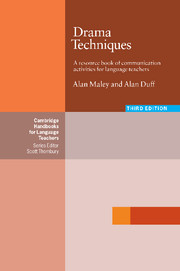Book contents
- Frontmatter
- Contents
- Thanks and acknowledgements
- Introduction
- 1 Getting ready
- 2 Observation
- 3 Working with mime
- 4 Working with the voice
- 5 Working with objects
- 6 Working with visuals
- 7 Working with the imagination
- 8 Working from/into words, phrases, sentences
- 9 Working from/into texts
- 10 Working from/into scenarios and scripts
- 11 Into Performance
- Bibliography
- Index
- References
8 - Working from/into words, phrases, sentences
Published online by Cambridge University Press: 03 May 2010
- Frontmatter
- Contents
- Thanks and acknowledgements
- Introduction
- 1 Getting ready
- 2 Observation
- 3 Working with mime
- 4 Working with the voice
- 5 Working with objects
- 6 Working with visuals
- 7 Working with the imagination
- 8 Working from/into words, phrases, sentences
- 9 Working from/into texts
- 10 Working from/into scenarios and scripts
- 11 Into Performance
- Bibliography
- Index
- References
Summary
We live in a web of words. They are everywhere. Without them we cannot communicate fully even our basic meanings, let alone the finer distinctions in our thinking. Words are at the heart of our first clumsy attempts to communicate in an unfamiliar language. To be ‘lost for words’ is to be lost indeed!
Words are not things, and yet they are. They are both more, and less, than what they seem. We combine and recombine them to achieve a multiplicity of effects: to describe, to persuade, to deceive, to curse, to love, to grieve, to light up our imagination, to bring aesthetic pleasure, etc. They are the stuff of magic. They give us power over things, and people. They afford infinite pleasure when we play games with them. As our experiences of life multiply, so the associations of the words with those experiences become more complex – so that meanings become personal as well as public. The words we use and the way we use them are subtly interwoven with our personalities.
In this chapter we shall focus on the rich storehouse of words to develop activities for communication and for dramatic effect.
- Type
- Chapter
- Information
- Drama TechniquesA Resource Book of Communication Activities for Language Teachers, pp. 160 - 188Publisher: Cambridge University PressPrint publication year: 2005



